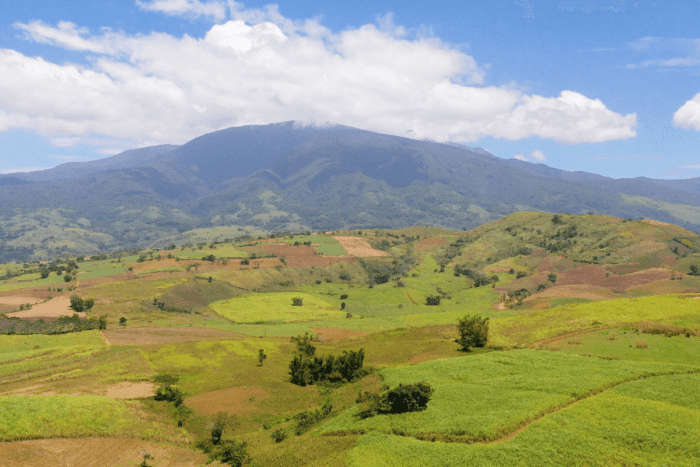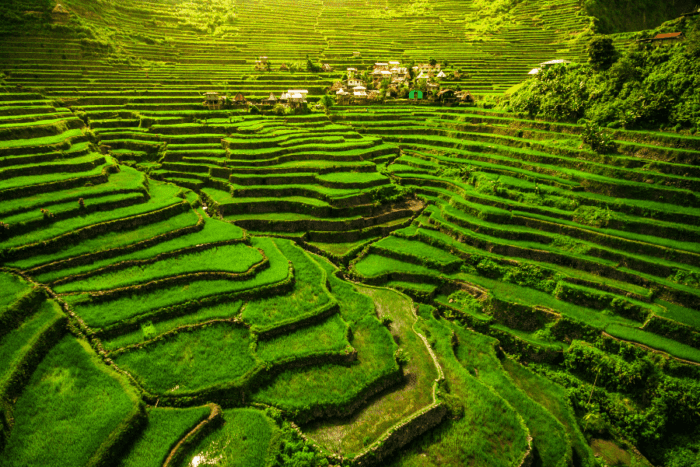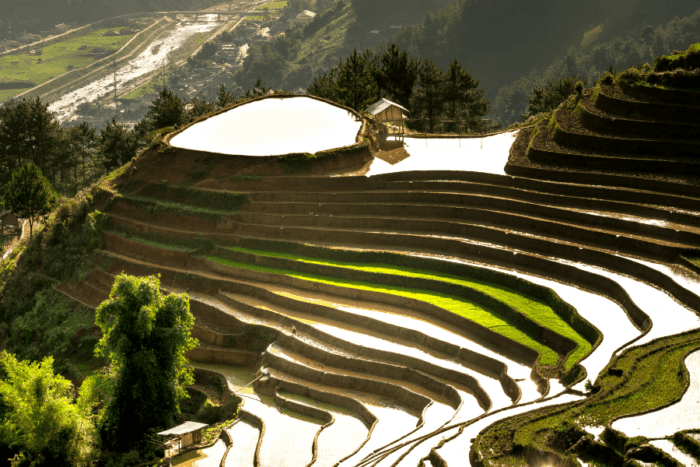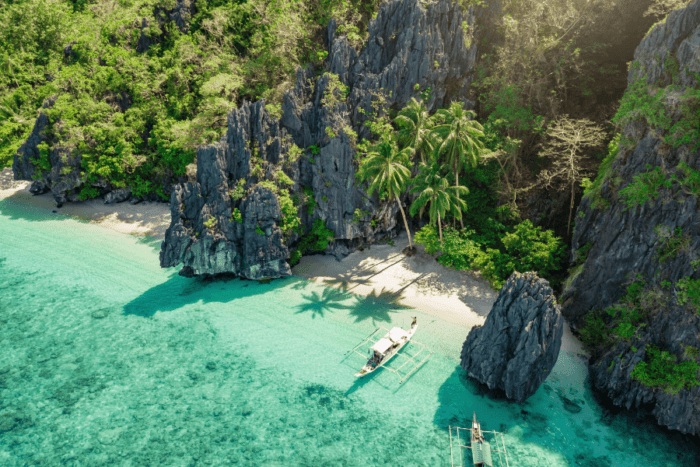Invest in Agriculture in Philippines without Getting Dirty
July 10, 2023
Dateline: Manila, Philippines
As central banks continue to push the “Copy” button on their printers, and the world population continues to grow, we’ve become a bigger fan of agricultural land.
Experts from Jim Rogers on down have endorsed agricultural land as a way to benefit from the increasingly affluent consumer cultures in regions such as Southeast Asia, where I’m currently located.
As populations grow and people obtain more wealth, they begin to seek out small luxuries. The guy who used to put back one beer after work each week might go out to a local bar now and have a few. Asians will eat a little less rice and add more protein. Kids will buy a Coca-Cola on their way home from school.
We talk a lot about ways to benefit from these emerging market trends by being on the ground with businesses that address these rapidly growing economies.
Apart from businesses, however, one way of supplying the market with the proper food production is by owning agricultural land. In fact, it can be a better play for the passive investor or even a more active entrepreneur who wants to cash in.
The Philippines has long been one of the top destinations for nomads.
It’s one of the cheapest places to live in Asia and offers one of the easiest residencies under its Philippines SRRV residency program.
The country is also known for having no property tax.
Agriculture in the Philippines has been bandied about as one of the best agricultural countries and top opportunities in this part of the world.
After all, Asia is home to more than half the world’s population. And, despite its reduced role in GDP, nearly eighty percent of all Filipinos are employed in the agriculture sector in some way.
Nevertheless, while yields can be decent if you know what you’re doing, the internet is littered with stories of bitter — and just unlucky — expats who got into the agriculture business here in the Philippines… and lost their shirt.
What’s worth mentioning, the Philippines is also known for being one of the best countries for property rental yields.
THE CURRENT STATE OF PHILIPPINE AGRICULTURE SECTOR

Laws on agricultural property are rather strict in the Philippines. Foreigners are prohibited from owning anything other than condominiums, and they certainly aren’t allowed to own farmland in rural areas.
At a business meeting the other night, we spoke with several of Manila’s top real estate and legal experts. They generally told us that there is no reliable way to circumvent the laws on buying land in the Philippines unless you want to enter the “ag tourism” business.
Even locals can’t own more than five hectares (about 12.5 acres) without exceptions. That means you’ve got a lot of small family farms, some whose owners take up work on neighboring farms to supplement their low farming income.
AGRICULTURAL PRODUCTIVITY IN THE PHILIPPINES

The Philippines is a country where agricultural work is largely done by hand. It could take up to one hundred workers to harvest one hectare of agricultural crops. Agricultural practices of the country normalized farms that could buy five machines, running crews of as many as two thousand Filipino farmers.
Agricultural productivity is not at its best. But farmworkers can be hired for as little as $75 a month, so small-scale operations have held off on improving their efficiency.
While the prospect of cheap agricultural land and dirt-cheap labor in the Philippines may sound appealing, consider what many OFWs (overseas foreign workers) have been doing with their money.
After years of Filipino workers in Singapore and the Middle East remitting cash home for their cousin’s jeepney business, or the family’s sari sari store, those workers are now putting their remittances into low-end real estate. However, issues with theft, misuse of money and incompetence are told, not only by expats who married Filipinos, but locals as well.
For instance, one former piggery owner we met with here in Manila says that she entrusted her ten-acre farm to her mother. One day, the mother called and informed her “all of the chickens died last night.”
Imagine fifty chickens all dying in one night. It turns out the mother had killed a few chickens to feed the “poor family” living nearby in the provinces far from Manila … and sold the rest under the table.
Personally, we believe that just because others fail at a business doesn’t mean that you can’t succeed. But agriculture in the Philippines is not a passive investment where you drop money and come back at harvest time to collect an envelope full of cash.
AGRICULTURAL DEVELOPMENT BUSINESS STRATEGIES THAT CAN SUCCEED IN THE PHILIPPINES

I spoke with one expat here who has found a way to profit from the rich agricultural land of the Philippines without being bogged down by regulations, the lack of scale, or the hands-on nature of running a potentially profitable farm here.
He says he’s bullish on rice production as a crop and that rice farmers suffer from some of the greatest inefficiencies in the Philippines. For example, an unmilled sack of rice can go for a small fraction of the price of processed rice ready to sell.
So he and his partners invested some decent money and offered an integrated service to farmers to mill their rice. In addition to profiting from the spread on the rice crop, he also offers cheap loans to rice farmers so they don’t have to take the “Bombay loans” that charge 60-80% annual interest, and sometimes result in their farm being taken over and a refining customer being lost.
The business philosophy is similar to that used by enterprising entrepreneurs during the California Gold Rush: sell shovels rather than pan for gold.
While the business of farming in the Philippines isn’t exactly overly competitive — there’s plenty of demand for food — it is one that is hard to scale.
And with the average farmer in the Philippines being 52 years old, the market for services like this looks like a good opportunity.
My connection has also opened a rendering plant to process leftover animal parts, from blood to feathers. In the United States, animal feathers would command a price from farmers who know their value. However, in the Philippines, farmers are literally paying to get rid of feathers. It’s a small, unsexy example of how to profit from discrepancies in a market, something we talk about here all the time.
SOME OF THE CHEAPEST AGRICULTURAL LAND IN ASIA

Mindinao Island is the largest island in the country and home to much of the Philippines’ fertile agricultural land.
Like Jim Rogers, we’ve become bullish on agricultural land as a store of value against money printing madness and other governing factors. People will always need to eat, and Asia’s population of nearly four billion people will consume more food than they have in generations.
While agricultural land in the Philippines is well-positioned to serve the fast-rising Asian continent, we also believe that farmland in Western countries will continue to shrink, creating more demand for imported foods.
Not only that, the Philippines — especially here in the south of Mindinao — is home to some of the cheapest agricultural land in the world.
My contact that brought us to San Isidro used to run a piggery here. She started a business where she actually lived and worked the land to get the process started. She knows the numbers inside and out.
And when she sold her first four-hectare (ten acres) farm almost two years ago, she pocketed almost double what she paid only two years earlier.
Even with a 100% appreciation rate in such a short period of time, her agricultural land — half of which was hilly and suitable for plants, and half of which was suitable for livestock — sold for about $600 an acre.
There’s talk online of acres of buying agricultural land in the Philippines that’s “as cheap as a hamburger”. People tend to point to South America as a place to buy dirt cheap agricultural land; and while farmland in South America can be a bit cheaper than land in the Philippines, it is harder to find in the bite-size parcels that are available in the Philippines.
The law here limits any person who can buy land to five hectares. Beyond that, you either need to start roping in family members, do a work-around with one of the Filipino agriculture companies to invest in, or set up a complicated “agriculture tourism” project to qualify for an exemption to the law.
However, for someone who has a limited amount of money to invest, or someone who even wants to work their land, the Philippines really is a cheap farmland hub. You could get a nice tract of land in the four figures.
But let’s remind you of one of the main agriculture problems in the Philippines. When it comes to investment in this sector: foreigners can’t own land in the Philippines.
HOW TO BUY LAND IN THE PHILIPPINES
Perhaps in a move to stomp out so-called financial imperialism, the country only allows foreign buyers to purchase condo units. As mentioned, foreign buyers can’t own detached homes or acreage.
Of course, there are a series of legal loopholes. For example, we met with one developer who is building townhouse-style “condos” near a secluded beach. Each townhouse connects in one place in the back of the unit, near a storage area. Since the law doesn’t mandate how many units need to be connected in order to qualify as a “condo”, nor where they must be connected, it appears this particular development found a way to get around the spirit of the law.
But how to invest in the agriculture business?
Foreigners are allowed to own up to 40% of a Filipino corporation that has in-country business interests (they’re allowed to own 100% of corporations that sell only offshore).
And everywhere you turn, someone has a new “foolproof” way to own land in the Philippines as a foreigner.
One way is for the foreigner to own 40% while dividing the remaining 60% among numerous Filipino nominees so as to dilute the voting rights of any particular nominee.
Another way is to set up a Filipino corporation where the vast majority of the agriculture stocks to invest in is owned by a foreign corporation (i.e. a US LLC or a Hong Kong limited corporation), and have Filipino nominees fill in the remaining scraps.
You should always consult with an attorney before enacting these measures because plenty of foreigners have been screwed by flimsy schemes they thought would allow them to get around the spirit of the law.
And the spirit is clear: foreigners shouldn’t own land in the Philippines.
Of course, plenty of foreigners simply put the land in the name of their Filipino girlfriend or relative. Suffice to say, nothing — absolutely nothing — has ever gone wrong with that strategy.
Ahem.
You’d think there could be a business for having globally-minded Filipinos — such as dual US-Philippines citizens — owning land for lots of people as their nominee. However, according to a real estate expert we met in Cebu, that idea has been tried and is now being cracked down on by the government.
Foreigners do have the right to lease agricultural land, and in some cases, that strategy could be the most lucrative as long as you have a trustworthy landlord.
Typical leases run 25 years with a 25-year renewal option and a clause that allows you to buy the land for one peso if the law on foreign ownership changes during that time. Some very eager people even fund a land purchase and then lease it back from a nominee at a very low rate.
Many have speculated that foreign ownership rules could be loosened up in the next ten or fifteen years, but it’s anyone’s guess.
Rents on agricultural land can be quite cheap as well, and yields can actually be halfway decent. Most people we talk to here suggest livestock such as pigs or goats as the most profitable way to go, but some have also suggested a mix of pigs and fruits and vegetables in order to feed the pigs homegrown food and save on feed cost.
What’s important to note is that in the last quarter of 2021 there have been some regional challenges in the agricultural sector in the Philippines despite the country’s attempts to address said regional and even global challenges in 2022.
HOW TO MAKE A PROFIT OFF AGRICULTURAL LAND IN THE PHILIPPINES
There are plenty of crops that can be grown here in Mindinao, from tobacco and coffee to rice or rubber trees. Coconut trees are plentiful, although coconut prices are down.
Meanwhile, you can raise everything from piglets to goats, chickens, cattle, or even quail (quail eggs are popular in the Philippines).
If you have a lot of money to invest and don’t want to go through the hoops of land ownership in the Philippines, you can take advantage of some of the world’s cheapest agricultural land with an “ag tourism” project and localize your capital investment in agriculture.
The guys at Philagrivest, for example, have a large plantation growing pili nuts and a strand of the beachfront property featuring homes, shopping, and future tourist facilities. The Philippines offers exemptions on foreign ownership rules and the five-hectare limit on individuals for those that start such a project.
Personally, we see land investing for a store of value as something that requires a title in hand. Here in the rural Philippines, there are plenty of lands where the last title was recorded a century ago. Since rural titles are recorded at the local “barangay” level, legal protections aren’t up to Western standards.
And if you get in a legal battle over property, expect it to be long and drawn out. The good news is that some legal battles can be settled easily by sending a little cash in the other direction.
IS THE PRIVATE SECTOR GROSS VALUE WORTH IT?
If you’re looking for ultimate security in owning agricultural land in a place that will be your breakthrough, the Philippines is probably not the place for you. There are loopholes, but none of them add much security.
There’s talk that foreign ownership restrictions could be lifted, but that could be ten or more years away. It’s possible you could include a $1 option to buy land you’re leasing if the law changes, but for now, there’s no way to own agricultural land outright.
That’s where thinking creatively comes into play. We’ve seen examples throughout Southeast Asia of how serving businesses can provide someone with a larger investment greater scalability and a clearer marketing plan than serving consumers.
There are a lot of areas to tap on within the natural resources premises other than agricultural development that’s more stable.
The fisheries sector, for example, reflected slow growth in recent years.
When you want to play in the agricultural sector in the Philippines, consider more peripheral ways to profit.


Is Land Investment Safer?
When American humorist and writer Mark Twain said, ’Buy land, they’re not making it anymore,’ he was definitely on to something. Land is finite, and that scarcity gives it lasting appeal. Yet, despite its obvious logic, land remains one of the most misunderstood investments. Many people are put off by its perceived complexity, potential legal […]
Read more

Top Emerging Market Economies for US Investors in 2025
If you’re still parking all your capital in overvalued US real estate or clinging to tech stocks in the S&P 500, you’re playing an old game while rivals are redesigning the board. The world has move on. Smart investors know that the biggest returns aren’t coming from Wall Street anymore – they’re coming from below-the-radar […]
Read more

Monaco Real Estate Guide: Market Trends and Opportunities
When it comes to luxury real estate, nowhere does things quite like Monaco. This tiny but ultra-exclusive principality isn’t just a place to live – it’s a global symbol of wealth, prestige and financial freedom. In 2025, Monaco remains the world’s most expensive real estate market, with average property prices soaring beyond €51,000 per square metre […]
Read more




